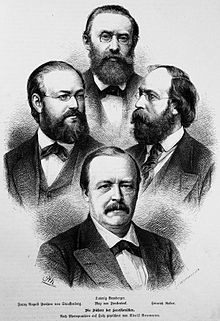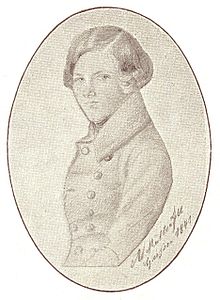Max von Forckenbeck

Maximilian (Max) Franz August von Forckenbeck (born October 23, 1821 in Münster , † May 26, 1892 in Berlin ) was a German administrative lawyer and politician in the Kingdom of Prussia . He was Lord Mayor of Breslau and from 1878 to 1892 Lord Mayor of Berlin . He is considered one of the most important Lord Mayors of Berlin because he achieved a lot for Berliners and their city through his careful and economical leadership.
Life
In 1821 Max von Forckenbeck was born into a family from Münsterland . His parents were the vice-president of the higher regional court in Glogau Franz von Forckenbeck (* 1796 in Münster, † 1849 in Berlin) and his wife Brigitte Hosius (1793 in Münster; † 1827 in Paderborn).
From 1838 he studied law at the Hessian Ludwig University . In 1840 he became active in the Corps Teutonia Giessen . As an inactive he moved to the Friedrich-Wilhelms-Universität zu Berlin .
From 1842 he first worked as a trainee lawyer and from 1847 as an assessor at the Glogau City Court . As president of the Liberal Constitutional Glogau Association since 1848, he was in 1849 by the Prussian Ministry of Justice for the East Prussian city of Morag as a lawyer admitted.
In 1858 Forckenbeck took part in the first congress of German economists and he was one of the founders of the Economic Society for East and West Prussia .
Until 1859 he worked as a city councilor and city representative at the district council . In 1859 he was elected to the Prussian House of Representatives as a member of the liberal parliamentary group and tried to establish a liberal party from the start. On January 13, 1861 the "Fraktion Forckenbeck" and the "Fraktion Vincke" separate. Forckenbeck founds the German Progressive Party .
In 1861 Forckenbeck made it to the committee of the German National Association , which he had joined in 1859. During the Prussian constitutional conflict from 1862 to 1866, as a leading member of the Progress Party, he tried to avoid the open conflict with Otto von Bismarck . Due to his careful efforts to reach an understanding, he was President of the Prussian House of Representatives from 1866 to 1873 and President of the Reichstag from 1874 to 1879 . At the same time, Max von Forckenbeck founded the National Liberal Party with others and was elected Lord Mayor of the city of Breslau on July 8, 1872 .
From 1873 Forckenbeck was a member of the Prussian mansion and was elected mayor of Berlin on September 26, 1878 with an overwhelming majority. In 1879 he devoted himself exclusively to his work as mayor and resigned from the office of President of the Reichstag . During his tenure, Forckenbeck devoted himself primarily to reforming the school system and expanding the urban infrastructure. For example, during his first term in office, the city's sewer system and water supply were improved and the transport network expanded. He also had the hygienic conditions in the city improved and numerous recreational opportunities created in the city, for example the Viktoriapark in Kreuzberg. Forckenbeck also campaigned for the privatization of urban sectors. A large part of Berlin's street lighting was provided by private companies.
All of these merits led to Forckenbeck being re-elected in 1890. During his second term in office he tried above all to improve the relationship between state and urban administration and aimed at incorporating the Berlin suburbs , which he himself no longer experienced. On May 26, 1892, Max von Forckenbeck died in Berlin of complications from pneumonia . His grave was in the Protestant Nikolaikirchhof .
family
He married Maria Reschke (1831–1876) in Königsberg in Prussia in 1856 . The couple had a son and three daughters:
- Franz (1857–1922), District Court Director in Frankfurt am Main, ⚭ Lisbeth Hagens (* 1868)
- Klara (* 1859), ⚭ Heinrich von Gablenz (1845–1917), Prussian lieutenant general
- Maria (* 1860), ⚭ Ernst Bothe (1854–1942), Prussian lieutenant general
- Anna (* 1864), ⚭ Konstantin von Bentheim († 1897), Prussian captain in the 2nd Guards Field Artillery Regiment
City honors
- Memorial plaque on Jüdenstrasse in Berlin-Mitte
- Forckenbeckplatz in Berlin-Friedrichshain
- Forckenbeckstrasse in Berlin-Schmargendorf
- Forckenbeckstraße (today ul. Aleksandra Hercena) until 1945 in what was then Breslau
Works
- The General Report of the Budget Commission was submitted by the MPs von Forckenbeck . Hermann, Berlin 1865
- The Reichstag election in Elberfeld-Barmen. Count von Bismarck, Max von Forckenbeck, Dr. from Schweitzer. A contribution to the history of the parties in Wupperthal . Lucas, Elberfeld 1867
- Answer of the Lord Mayor of Berlin to the attacks by the Reich Chancellor . Gustav Schade, Berlin 1881 (speech by Mayor Dr. von Forckenbeck on April 30, 1881)
literature
- Erich Angermann : Forckenbeck, Maximilian (Max) Franz August von. In: New German Biography (NDB). Volume 5, Duncker & Humblot, Berlin 1961, ISBN 3-428-00186-9 , pp. 296-298 ( digitized version ).
- Max von Forckenbeck, President of the Prussian House of Representatives. Biography with portrait . Jonas, Berlin 1867.
- Hermann Oncken: Forckenbeck, Max von . In: Allgemeine Deutsche Biographie (ADB). Volume 48, Duncker & Humblot, Leipzig 1904, pp. 630-650.
- Martin Philippson: Max von Forckenbeck. A picture of life . Reissner, Dresden / Leipzig 1898 ( Men of the time. Life pictures of outstanding personalities of the present and recent past , 6).
- Hermann Robolsky: The German Liberals: Eugen Richter, Heinrich Rickert, Professor Hänel, Professor Virchow, Max von Forckenbeck, Freiherr Schenk von Stauffenberg, Ludwig Bamberger, Ludwig Löwe, Professor Mommsen . Renger, Leipzig 1884 ( The German Reichstag by H. Wieramann, part 1).
- Heinrich Steinitz: Max von Forckenbeck. Lord Mayor of Berlin. A picture of life. Anniversary edition for the 70th birthday . Mickisch, Berlin 1891.
- Helmut Steinsdorfer: Max von Forckenbeck (1821-1892). On the 100th anniversary of the death of the MP, Speaker of Parliament, Lord Mayor of Wroclaw and Berlin . In: Historische Mitteilungen 6, 1993, pp. 75-95.
Web links
- "Friedrichshainer Chronik" with information on Forckenbeck and the square; Retrieved February 11, 2009
- Maximilian Forckenbeck on berlinstreet.de
- Max von Forckenbeck in the database of members of the Reichstag
- Biography of Max von Forckenbeck . In: Heinrich Best : database of the members of the Reichstag of the Empire 1867/71 to 1918 (Biorab - Kaiserreich)
Individual evidence
- ↑ a b Gothaisches genealogical Handbook of postage noble houses , Second Year, Justus Perthes , Gotha 1908, pp 291- 292 .
- ↑ Kösener corps lists 1910, 58 , 20
- ^ Gerhard Eisfeld: The emergence of the liberal parties in Germany , Verlag für Literatur und Zeitgeschehen, Hannover 1969, p. 23.
| personal data | |
|---|---|
| SURNAME | Forckenbeck, Max von |
| ALTERNATIVE NAMES | Forckenbeck, Maximilian Franz August von (full name) |
| BRIEF DESCRIPTION | German lawyer and politician (NLP), Member of the Bundestag, Mayor of Berlin (1878-1892) |
| DATE OF BIRTH | October 23, 1821 |
| PLACE OF BIRTH | Muenster |
| DATE OF DEATH | May 26, 1892 |
| Place of death | Berlin |


